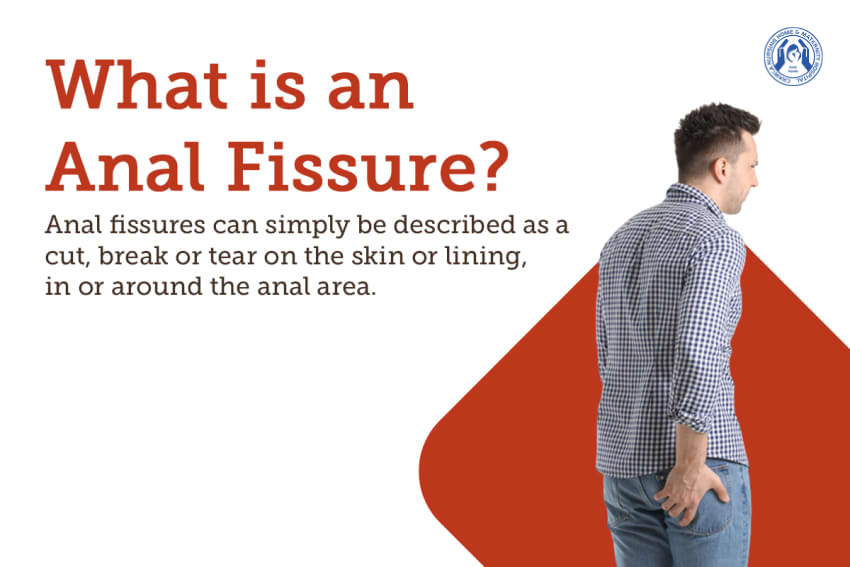
Anal Fissures Treatment
An anal fissure is a crack or splits in the tissues that line your anal canal. Trauma causes the lining to tear, causing acute pain and bleeding. Most fissures heal with self-care.
What is an anal fissure?
An anal fissure is a crack or tear in the lining of your anal canal. It’s a common cause of anal pain and rectal bleeding, especially during bowel movements (pooping).
Anal trauma usually causes a fissure, especially from straining to pass hard stools. Anal fissures can occur suddenly or gradually. They can also heal quickly or slowly.
Are anal fissures common?
Anal fissures are very common, especially in infants and pregnant people. About half of people with anal fissures get them before they turn 40.
What are the symptoms of an anal fissure?
The most common symptoms are:
- Sharp pain when pooping.
- Burning or itching with pooping.
- Fresh, red blood in your poop.
Some people may also have:
- Anal muscle spasms.
- A lump on the skin near the tear.
What does an anal fissure feel like?
Most people — but not all — feel pain with an anal fissure. They feel it most when pooping, but it can last for minutes to several hours after. They describe it as sharp, tearing, cutting or burning. Some people find that the pain radiates to their buttocks, upper thighs or lower back.
How do I know if I have a hemorrhoid or an anal fissure?
Haemorrhoids and anal fissures have similar symptoms and causes, and it’s easy to mistake one for the other. Both can happen when you strain too much to poop, and both can cause rectal bleeding, anal pain and anal itching.
While haemorrhoids are more common, anal fissures are more commonly the cause of anal pain. Haemorrhoids don’t always cause pain, but 90% of fissures do. However, the pain from a fissure usually occurs in episodes, while haemorrhoid pain can be constant.
What is the main cause of an anal fissure?
Trauma — like stretching and straining — causes your anal lining to tear. But preexisting conditions can also play a role. This has to do with the anatomy of your anus (butthole), which is the last few centimetres of the long, muscular tube known as your large intestine.
Toward the end of your anus, where it opens to the outside, the skin is more like the skin on the outside of your body. But in the upper portion, where fissures usually happen, your anus is lined with the same soft mucosa as the rest of your large intestine.
This mucous lining is thinner and more delicate than normal skin, making it easier to tear. This is especially true for babies, who often get anal fissures. It can also become inflamed by injury or disease. Long-term (chronic) inflammation can weaken the tissues.
Your anus is surrounded by two circular muscles that help control your bowel movements (your anal sphincters). If these muscles are too tight, they can add tension to your anal lining, making it easier to tear and even reducing blood flow to the tissues.
Primary causes of anal fissures include:
- Chronic constipation and straining to poop.
- Obstructed defecation syndrome.
- Infant dyschezia.
- Chronic diarrhoea.
- Childbirth.
- Penetration.
Other contributing conditions include:
- Prior surgery.
- Sexually transmitted infections (STIs).
- Inflammatory bowel disease (IBD).
- Anal cancer.
- Tuberculosis (TB).
- Diaper rash.
What are the possible complications of anal fissures?
Many anal fissures heal by themselves in a few weeks, but complications can develop when they don’t. These are called chronic anal fissures. Instead of healing, they continue to reinforce themselves in a vicious cycle, leaving a persistent wound.
Pain and muscle clenching can cause your anal muscles to tighten and spasm. Muscle tension and anal spasms pull the fissure apart and reduce blood flow to the tissues. This makes it harder for it to heal, and also more painful, causing more tension.
If anal fissures go on too long without healing, they can lead to further complications, such as:
- Faecal impaction.
- Anal stenosis (narrowing of the anal canal that can make it harder to poop).
- Anal fistula.
How are anal fissures diagnosed?
A healthcare provider will ask you about your symptoms, and then try to see the fissure. You’ll lie on your belly or your side while they gently separate your buttocks. If this is too painful, they don’t have to go further. They can safely assume that you have an anal fissure.
But if you can tolerate an exam, they’ll try to see the fissure so that they can rule out other possible causes for your symptoms. They might gently insert a lubricated gloved finger to open your anus, noticing any tenderness or muscle spasms. This is a digital rectal exam.
What is the medical treatment for anal fissures?
When you have a chronic anal fissure — one that has lasted more than eight weeks — medical treatment focuses on relaxing the anal sphincter muscles that surround your anal canal. This should allow the fissure to begin to close and help restore blood flow to the tissues.
Medications
Medications for anal fissures include:
- Nitroglycerin ointment. Nitroglycerin is a vasodilator, a medicine that makes your blood vessels expand. Applied as a cream, it can restore blood flow and can help your anal sphincter relax. However, it can cause headaches, and some people have to discontinue it for this reason.
- Calcium channel blockers, such as diltiazem or nifedipine, are an alternative way of relaxing blood vessels and your anal muscles. These medications may work for you if nitroglycerin doesn’t.
- Bulk Laxatives. Not everyone with constipation needs to take medication for it, but medications can help if you have very hard poops that cause additional stress on your anal fissure. Bulk laxatives, such as Metamucil® (psyllium), draw fluid into your gut to help soften your poop.
Surgery
If your anal fissure won’t heal with medication, or it comes back after healing, you might need a minor medical procedure to end the cycle. Medications have mixed results for chronic anal fissures, but surgery, if it comes to it, has a 90% success rate.
The procedure is called an internal sphincterotomy. While you’re asleep under sedation, a colorectal surgeon makes a small cut into your anal sphincter muscle to release tension permanently. After you wake up, you can go home the same day.
Should I adjust my diet while living with an anal fissure?
It might help to:
- Drink more water.
- Eat more fresh fruits and vegetables.
- Avoid spicy foods and nuts while you have symptoms.
A note from Chawla Nursing Home
Anal fissures are common, and not normally dangerous, but they can hurt a lot. Most anal fissures heal in a few days to weeks with a little self-care. But some anal fissures are more complicated and may resist healing. If you have a chronic fissure, don’t hesitate to seek medical treatment. A healthcare provider will work with you to bring you relief.
The Chawla Nursing Home medical team at Chawla Nursing Home understands the risks and rewards that come with Anal Fissures Treatment, and we will help you through every step of the way. Schedule a consultation appointment with one of our doctors at our Jalandhar location to find out if Anal Fissures Treatment is your best option for prevention and safety purposes.
Schedule An Appointment
Get your Appointment Confirm with us Easily

